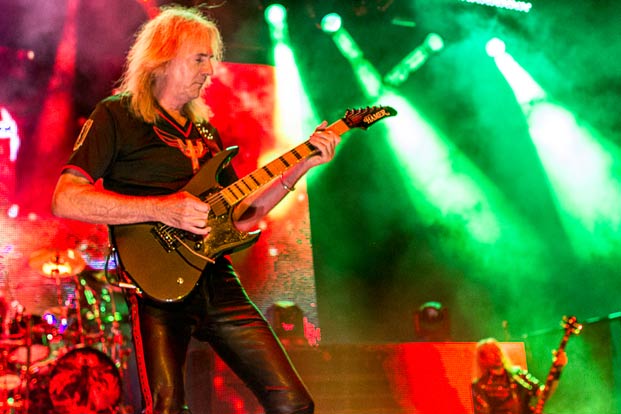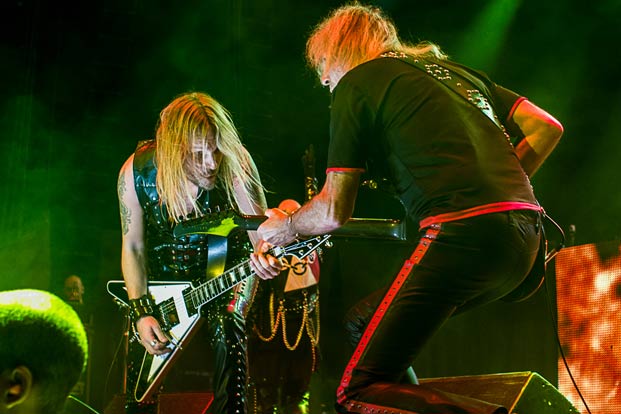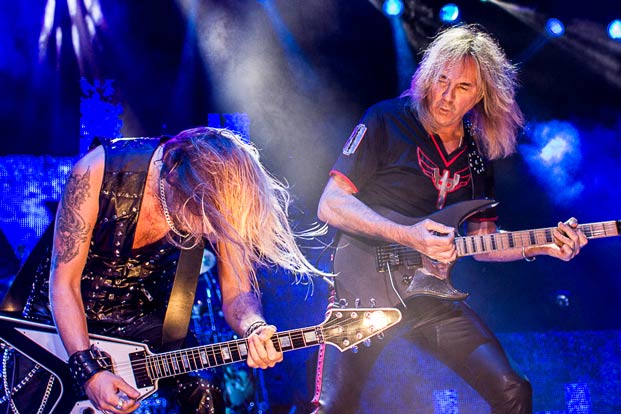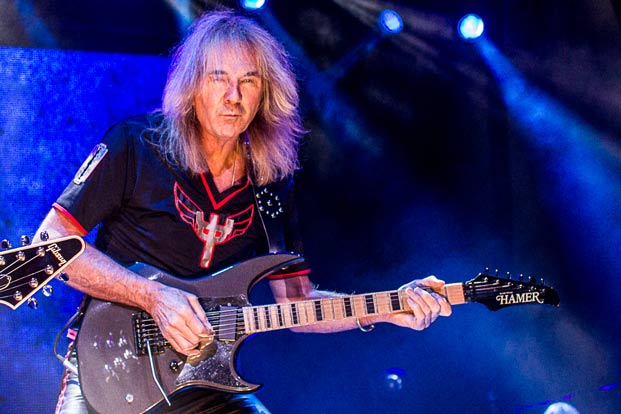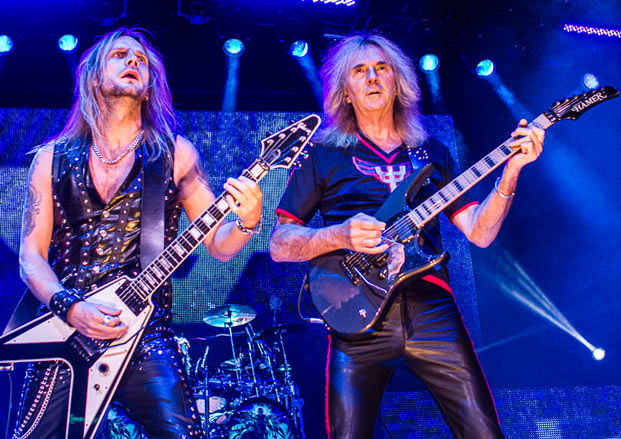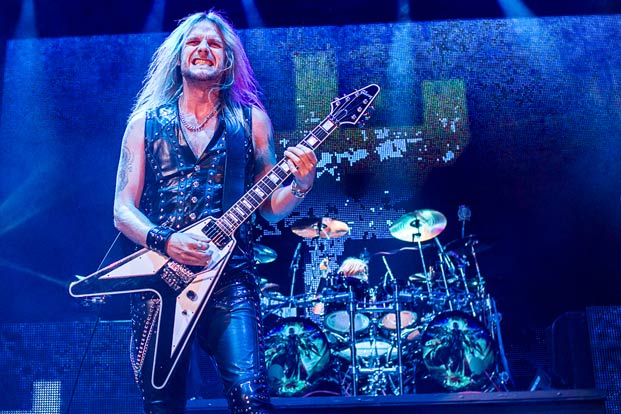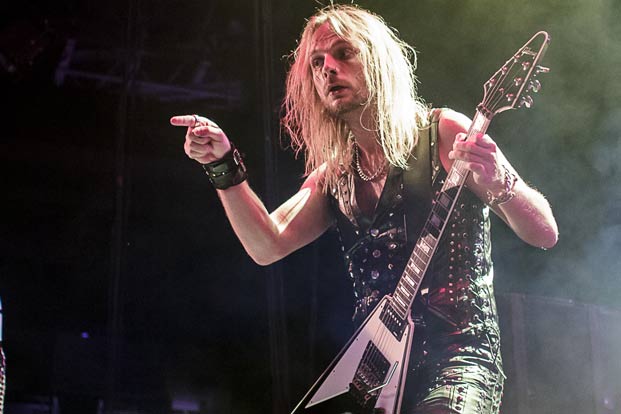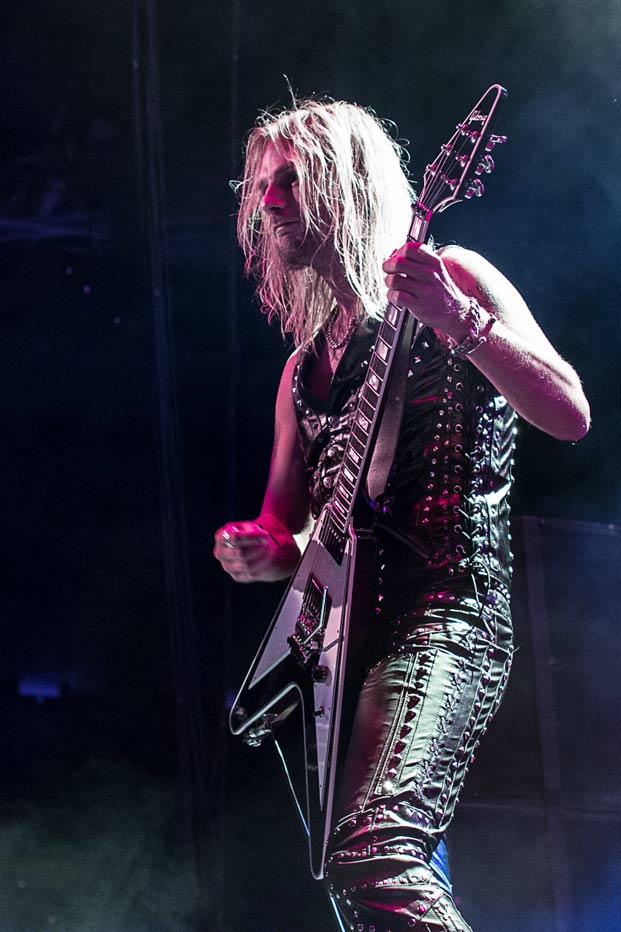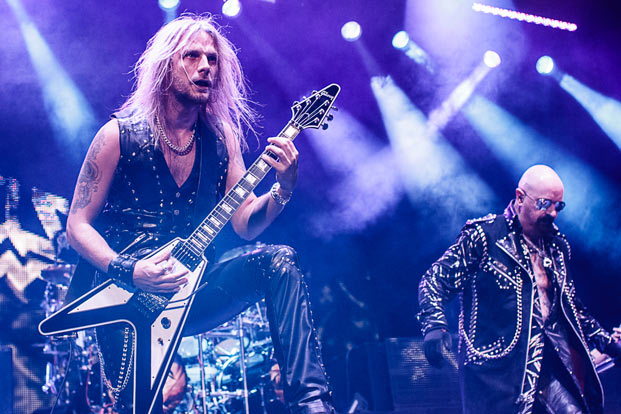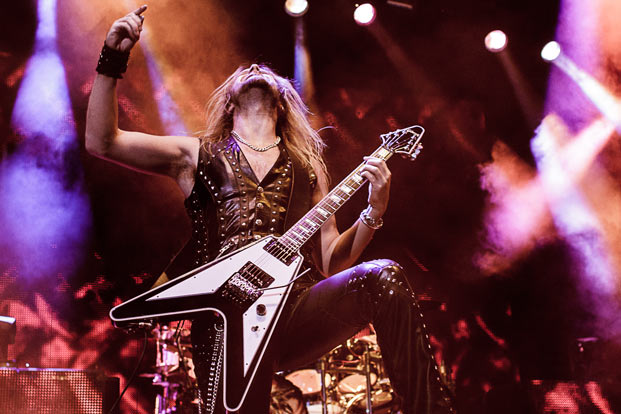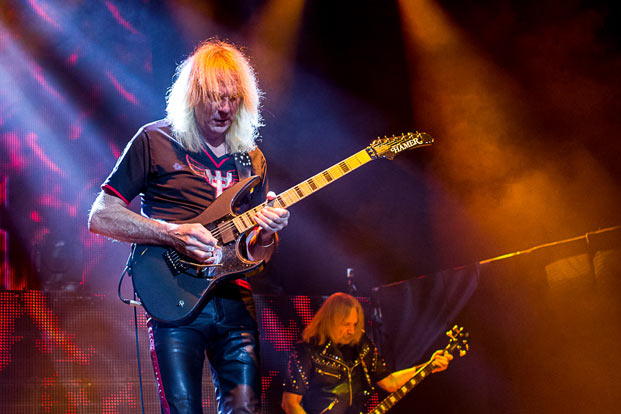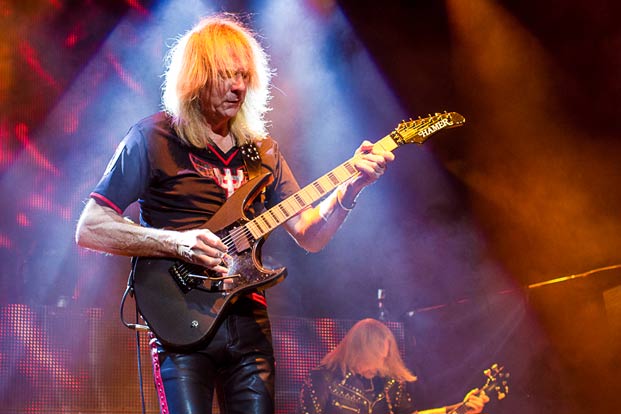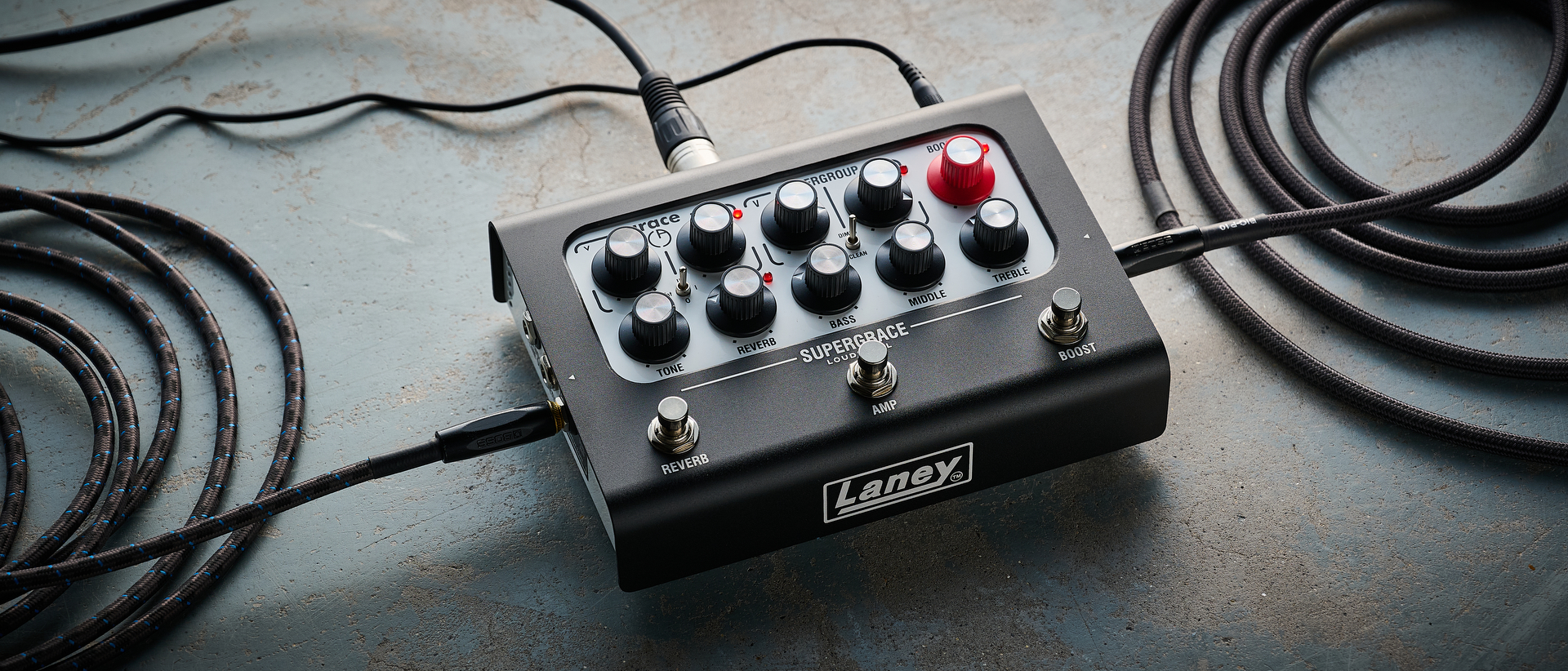Judas Priest's Glenn Tipton and Richie Faulkner Talk New Live DVD, 'Battle Cry'
All the latest guitar news, interviews, lessons, reviews, deals and more, direct to your inbox!
You are now subscribed
Your newsletter sign-up was successful
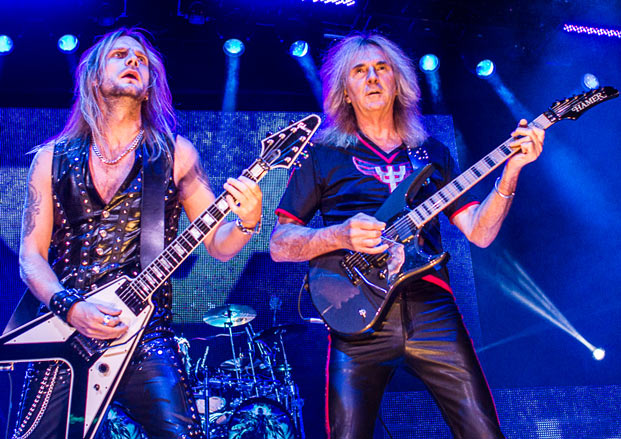
A battle cry is defined as a slogan expressing the ideals of people promoting a cause.
Over the last 40 years, Judas Priest’s music has been nothing short of a battle cry for heavy metal fans worldwide.
Priest—possibly the first act to embrace the notion of being a “heavy metal” band—have remained true to that mission since day one.
In 2015 Judas Priest played before 85,000 fans at Germany’s Wacken Festival. The performance was captured and will be released March 25 on Blu-ray, DVD, CD and digital download as Battle Cry.
We recently had the chance to speak to the guitar duo of Glenn Tipton and Richie Faulkner about the experience.
When you went into to do the Wacken show, were you planning to do a DVD or did the footage dictate that it should be released?
FAULKNER: We were aware it was being filmed. We weren’t aware of how it was going to turn out, obviously. Wacken films the headliners, if not most of the bands. When the footage became available and we saw it, we thought it was a no-brainer. We saw the production, the crowd, the energy and we thought it would be a great thing to put out. We thought it was a great performance to give to Tom Allen and mix properly and put out to the fans around the world.
All the latest guitar news, interviews, lessons, reviews, deals and more, direct to your inbox!
When you're waiting to go on stage, do you still get butterflies?
TIPTON: Not particularly. Priest puts on a big production and a lot of things can go wrong on a big production. You learn quickly where not to be at a particular point in a song. There are motorbikes, lighting gantries moving, explosions and flames. I don’t really get nervous, and if I do it’s a nervous excited, which is adrenaline kicking in. You hear the roar of the crowd and it‘s natural to feel that rush. It makes you perform better. It makes you look forward to walking on that stage and performing.
FAULKNER: I've always been fairly calm. Obviously there is a feeling of excitement. Nerves have never been my thing. I focus on the task at hand. You never know what's going to happen or how the crowd is going to be. Every night when the intro tape comes on, it's an exciting thing. You hear the crowd, especially at Wacken. We got there fairly late in the evening. We got leathered-up and went up to the back of the stage. You can hear 85,000 metal maniacs. I’m getting goose bumps now talking about it. It's the most overwhelming rush of energy. It's like a big reunion of our family. There is definitely an emotional connection.
With festivals like Wacken do you get an opportunity to do a sound check?
TIPTON: We don’t like sound checking. We have a really good, reliable crew that know our sounds and they set it all up. We turn up about an hour and half before a show and warm up and then can just walk on stage. We are a band that really feeds off an audience. Sound checks are boring. In the initial stages of the tour we have to make sure the sound quality is good for the audience. Later on down the road when we’re well oiled we don’t like them.
You open the set with “Dragonaut” from Redeemer of Souls. Do you like to be able to open with a new track when you are touring to support an album?
TIPTON: I think it is a sign of confidence in the album that we choose to use a brand-new song that people haven’t heard us play live as the opening number. It illustrates how proud we are of Redeemer of Souls as an album.
Was that special for you, Richie, to have songs you were involved with added to a Priest setlist?
FAULKNER: It’s incredible. Just playing on the Epitaph tour on the live performance and playing those great songs was a joy and an honor. To actually create something in the studio and then go out and play those live is a different connection. I grew up with songs like “Painkiller” and “Desert Plains." You have a connection to those songs as a fan. And now with the new songs it is different. I was there when some of those riffs were conceived. There are ideas I came up with in my living room or kitchen. Now metal maniacs all around the world are singing back riffs and guitar solos you created, it is an incredible thrill.
Especially after the extremely long set you guys did on the Epitaph tour, covering so much material, are the songs to the point where you are on auto pilot as a player or do you still have to think about keys and scales?
FAULKNER: That’s a good question. As far as a set list we give a lot of thought to what we are going to present song-wise. We did swap out songs on different legs of the tour. We give that a lot of consideration. If you put a song into the set, you have to take someone’s favorite out.
Personally it is always a conscious thing to do your best on the performance. I have been doing it long enough that it has become part of how I play. It is autopilot in that it’s part of you but in another sense you are kind of focused on what you are putting across. Especially in my position replacing someone five years ago. You have to respect the legacy and continue it and build your own part of the legacy.
Does it make it more interesting to you as a player to play some of the new material?
TIPTON: It is and particularly this time with “Halls of Valhalla.” “Dragonaut.” “March of the Damned” and sometimes four or five songs off of the new album. It’s a lot, really. The kids want to hear their old favorites and they may not be that familiar with the new stuff at that point in time. Everyone asks us if we get fed up playing “Another Thing Coming," “Hell Bent for Leather” or “Living After Midnight” and the fact is that the kids want to hear them.
As soon as you strike them up in front of an audience it is like the first time you ever played it. It’s so enjoyable and the audience is singing along. Our concerts are a union with Judas Priest and the audience. When we play numbers that fans can sing along with the atmosphere is so electrifying that you never get fed up with these songs.
I noticed in particular Glenn when you started “Living After Midnight” you couldn’t hide the smile on your face.
TIPTON: I think “Screaming for Vengeance” was good to play for the first time in a while on this tour. Songs like “Living After Midnight” are enjoyable. When you have been around as long as Priest it is really difficult to choose what to play. We’ve played “Metal Gods," for example, for so many years. But is just feels right. We feed off of the audience.
Richie, I have noticed seeing you live and on film that you tend to point to audience members and really interact. Obviously with 85,000 people that is just a sea of humanity but do you try to pick out certain people to gauge the performance or is that random?
FAULKNER: A little of both, really. If someone is really into it you kind of get drawn to that. You try to interact and share a moment with them. Other people might be a bit more introverted and you try to draw them out of their shell. It depends. I always remember being out on tour opening for Iron Maiden about 10 years ago with Lauren Harris’ band. Looking up every night at Steve Harris interacting and singing really stayed with me. You can’t recreate that interaction. It stayed with me.
Being that you have been dealing with video screens with for however many years as part of your show, is it different when you know you are being filmed? Can you just tune that out?
TIPTON: I think if everyone is honest they are always a little nervous of a show that is being filmed. Particularly at my age I don’t really want to be filmed any more (laughs). I used to want to be in the frame and now I want to be out of the frame. Let Richie be in the frame. He’s a good-looking guitar player [laughs]. I am a little more hesitant and a little less confident when it‘s being filmed. You think we are being filmed or recorded tonight so I'd better be note perfect. That creeps into your head in a band like Priest because we're all over the stage. If you stand in one place like Eric Clapton, you can play note perfect. It adds a little stress. You tend to forget that after the second or third number. You forget the cameras are there.
You've come a long way in this industry; in the last 15 years, the YouTube generation has become a factor. Does that ever get into your head and you get disgusted with people holding up phones and filming you when you aren’t planning on it?
TIPTON: We used to look for good photographs and that is what we would release. Now all over the Internet there are thousands of pictures of the band looking our best or our worst. There is nothing you can do about it and you have to accept it. It is good in a way. You get up there and play the music and forget the visuals. It is the songs that count. You have to turn these things. Everyone says the Internet is a bad thing. You have to go with it. You can’t whine about it. It does promote good live acts. You have to go out there and play and show what you can do.
I noticed you guys have put on a very extensive video production on this tour. Do you get involved with that or just let the creative folks worry about it?
TIPTON: We have a lot of faith in our lighting design guy, Tom Horton, and he knows how we think. In the initial stages we get involved to set the direction. After he puts something together we get involved in the fine details. It is really difficult to come up with new ideas time after time. We try to give the kids something for the money they are paying.
It seems like metal bands really do pay attention to the production. It would seem hard after all the tours you've done to outdo yourselves. The show looked fantastic.
TIPTON: We have so many songs that it has often crossed our minds to go back to basics and do a no-frills show. Just Engl amps and just play the songs. The songs are the legacy. On paper that sounds like a good idea because we have 18 albums and 40 years, but the kids still want to see some sort of production. It gets tricky. There is always someone in the audience that hasn’t seen the band before.
I think it’d be a trip to see you guys come out in the Rocka Rolla outfits from the beginning with the bell-bottoms. But that would take away from the fan that hasn’t seen Rob on the motorcycle.
TIPTON: [Laughs] You want us to go on stage in bell-bottoms?
It’d be interesting. I think you guys could pull it off.
TIPTON: If I can wear leather trousers at my age, I can pull bell-bottoms off.
As far as amps and gear, do you guys go for the emulators or do you have stuff behind the screens?
FAULKNER: We're full-blown with Engl stacks with 4x12 behind the screens. They're cranked. We do it the old-school way, if you will. My philosophy is if you can use the real stuff I think that's the way you should go. Sometimes stage space or shipping forces you do those things, and that’s totally fine.
At Wacken, because of the cameras, you're a bit further away from the audience. Does the distance from the stage the fans needed to be bother you?
TIPTON: It really doesn’t bother us. If it's a festival, everything is exaggerated and you have the screens that bring you to the audience. But I have to say occasionally on warmup gigs or fill-in gigs or whatever reason we do a smaller show and the audience is right there with you, I love that. I love to communicate with the audience. I love the eye contact and the singing along with them. You get to know them for that short moment of time you're on stage. It's a very important thing for me.
FAULKNER: It's a different dynamic, that's for sure. We did some theaters in the states where the fans are right on top of you. You can hear them singing and screaming. In the bigger venues you have the enormity of the situation. You have the sounds and the band in a massive venue. So there are different dynamics that add to the magic of both scenarios. Of course, 85,000 at Wacken is a whole different energy.
TIPTON: Obviously it is not so intimate. You can still pick a few fanatics out. It is still enjoyable.
Are you guys in the writing process at this point?
FAULKNER: That's the plan. We're going to meet up next month and go and see what ideas we’ve got. I’m always coming up with riffs or melodies. We get together to pore over the ideas. Hopefully the ideas are great. We have a big legacy to uphold. These guys have been doing this for 40 years. Redeemer was the first Top 10 entry on Billboard that the band has ever had. It’s a great springboard, if you will. We’re looking forward to getting into the studio and seeing what we've come up with.
Battle Cry will be available March 25. Visit judaspriest.com for more information.
